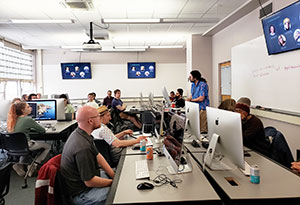Academic Workshop to Promote Workflow Management System Held at UW
Published June 30, 2023

Participants in a recent academic workshop were introduced to Nextflow -- a workflow management system -- to learn how it can be used to take advantage of the University of Wyoming’s Advanced Research Computing Center (ARCC) and help advance research objectives.
UW’s ARCC is among the best high-performance computer clusters in the United States.
The Wyoming Department of Health Public Health Laboratory, UW’s ARCC, Wyoming IDeA Networks for Biomedical Research Excellence (INBRE) Data Science Core, and the Department of Mathematics and Statistics sponsored the workshop. The free program was held on campus in May.
“Nextflow is a way to write scalable and reproducible scientific workflows, which are a necessity when working with big data,” says Robert Petit, Wyoming Department of Health Public Health Lab bioinformaticist and a UW statistics adjunct professor. “Nextflow has a strong backing in the field of bioinformatics and has been used in other fields, including astronomy, artificial intelligence, imaging analysis, machine learning and economics.”
Petit; Dan Hintz, a UW master’s degree candidate in statistics; Liudmila Mainzer, ARCC director; and Tim Robinson, a UW statistics professor, co-developed the workshop content. Petit and Hintz led the workshop. Nic Blouin, Wyoming INBRE Data Science Core director, also was instrumental in the workshop’s development.
The event brought together experts from the Wyoming Department of Health Public Health Laboratory as well as faculty and graduate students from across several UW departments. The workshop provided discussions and hands-on learning with the basic inner workings of Nextflow and how the system can streamline researchers’ analyses.
“I am extremely grateful to Petit, Mainzer and Blouin for making this workshop possible. Nextflow is a powerful workflow management software for high-performance computing, and I am thrilled to see researchers from across campus have an opportunity to come together to learn about its capability,” Robinson says. “I was especially proud to see one of our graduate students, Dan Hintz, be one of the main presenters.”
According to Hintz, a personal highlight from the workshop was the opportunity to create a template for parallel computing specifically tailored to statistics, a departure from Nextflow’s traditional applications in bioinformatics.
“Reflecting upon this experience, I wish this kind of workshop had been available to me when I first started learning Nextflow,” he says.
Mainzer says it is important to continue expanding the user base for Nextflow.
“In our experience, it is the most mature, versatile and flexible workflow management platform for big-data analysis,” Mainzer says. “Most of these platforms are open source and grant-funded. Thus, the size of the user base and the extent of adoption matter for the success of this software.”
Feedback from attendees showed a positive impact from the training.
“As a part of the seminar, I learned the basics of creating a Nextflow workflow, which is important for creating programs that deal with a high throughput of data for an RNA-Seq project I am working on,” says Chris Biggs, a UW chemical engineering alumnus. “It was an excellent way to start my training for my new job.”
Joe Reed, an administrator with the Wyoming Public Health Laboratory, says the partnership between the Wyoming Public Health Laboratory and UW provides a setting where experts can come together to teach the next generation of bioinformatics scientists.
“These types of workshops are particularly important because there are not enough bioinformatics scientists to fill jobs across the country,” Reed says. “This workshop mimicked real-world bioinformatics applications and exposed students to new high-throughput computing technology that is used by public health laboratories across the nation. The goal of this workshop was to reinforce the students’ education by challenging them to apply their knowledge to new bioinformatics tools.”
Blouin praises the work of Petit and Hintz, who offered to run a Nextflow tutorial at UW.
“The INBRE Data Science Core has increasingly seen how workflow management can help our network with improved analysis outcomes, including transcriptomics, source tracking and microbiome analysis,” Blouin says. “We had an overflow turnout for the event, and that is a testament to the interest and need among our network participants.”
For more information about Nextflow and its use on ARCC, email Erin Paiva, ARCC program manager, at epaiva@uwyo.edu.

